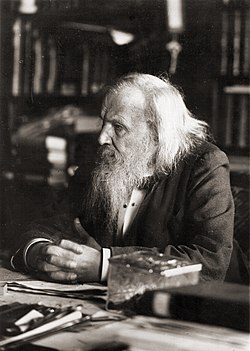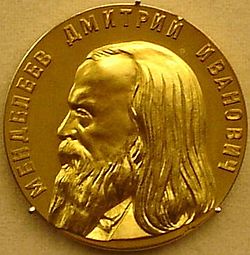This is an old revision of this page, as edited by 99.72.114.206 (talk) at 20:23, 10 February 2010 (→Periodic Table). The present address (URL) is a permanent link to this revision, which may differ significantly from the current revision.
Revision as of 20:23, 10 February 2010 by 99.72.114.206 (talk) (→Periodic Table)(diff) ← Previous revision | Latest revision (diff) | Newer revision → (diff)| Dmitri Mendeleev | |
|---|---|
 Dmitri Mendeleev in 1897 Dmitri Mendeleev in 1897 | |
| Born | (1834-02-08)8 February 1834 Verhnie Aremzyani, Russian Empire |
| Died | 2 February 1907(1907-02-02) (aged 72) St. Petersburg, Russian Empire |
| Nationality | Russian |
| Alma mater | Saint Petersburg University |
| Known for | Inventing the Periodic table of chemical elements |
| Scientific career | |
| Fields | Chemistry, physics and adjacent fields |
| Notable students | Dmitri Konovalov, Gemilian, Valery, Baykov, Alexander |
Dmitri Ivanovich Mendeleev (also romanized Mendeleyev or Mendeleef; Template:Lang-ru listen) (8 February [O.S. 27 January] 1834 – 2 February [O.S. 20 January] 1907), was a Russian chemist and inventor. He is credited as being the creator of the first version of the periodic table of elements. Using the table, he predicted the properties of elements yet to be discovered.
Life
Mendeleev was born in Verhnie Aremzyani village, near Tobolsk, to Ivan Pavlovich Mendeleev and Maria Dmitrievna Mendeleeva (née Kornilieva). His grandfather was Pavel Maximovich Sokolov, a priest of Russian Orthodox Church from the Tver region. Ivan, along with his brothers and sisters, obtained new family names while attending theological seminary.
Mendeleev is thought to be the youngest of 14 siblings, but the exact number differs among sources. At the age of 13, after the passing of his father and the destruction of his mother's factory by fire, Mendeleev attended the Gymnasium in Tobolsk.
In 1849, the now poor Mendeleev family relocated to Saint Petersburg, where he entered the Main Pedagogical Institute in 1850. After graduation, tuberculosis caused him to move to the Crimean Peninsula on the northern coast of the Black Sea in 1855. While there he became a science master of the Simferopol gymnasium №1. He returned with fully restored health to Saint Petersburg in 1857.
Between 1859 and 1861, he worked on the capillarity of liquids and the workings of the spectroscope in Heidelberg. In late August 1861 he wrote his first book on the spectroscope. On 4 April 1862 he had got engaged to Feozva Nikitichna Leshcheva, and they married on 27 April 1862 at Nikolaev Engineering College's church in Saint Petersburg. Mendeleev became Professor of Chemistry at the Saint Petersburg Technological Institute and Saint Petersburg State University in 1863. In 1865 he became Doctor of Science for his dissertation "On the Combinations of Water with Alcohol". He achieved tenure in 1867, and by 1871 had transformed Saint Petersburg into an internationally recognized center for chemistry research. In 1876, he became obsessed with Anna Ivanova Popova and began courting her; in 1881 he proposed to her and threatened suicide if she refused. His divorce from Leshcheva was finalized one month after he had married Popova (on 2 April) in early 1882. Even after the divorce, Mendeleev was technically a bigamist; the Russian Orthodox Church required at least 7 years before lawful re-marriage. His divorce and the surrounding controversy contributed to his failure to be admitted to the Russian Academy of Sciences (despite his international fame by that time). His daughter from his second marriage, Lyubov, became the wife of the famous Russian poet Alexander Blok. His other children were son Vladimir (a sailor, he took part in the notable Eastern journey of Nicholas II) and daughter Olga, from his first marriage to Feozva, and son Ivan and a pair of twins from Anna.
Though Mendeleev was widely honored by scientific organizations all over Europe, including the Copley Medal from the Royal Society of London, he resigned from Saint Petersburg University on 17 August 1890.
In 1893, he was appointed Director of the Bureau of Weights and Measures. It was in this role that he was directed to formulate new state standards for the production of vodka. As a result of his work, in 1894 new standards for vodka were introduced into Russian law and all vodka had to be produced at 40% alcohol by volume.
Mendeleev also investigated the composition of oil fields, and helped to found the first oil refinery in Russia.
In 1905, Mendeleev was elected a member of the Royal Swedish Academy of Sciences. The following year Nobel Committee for Chemistry recommended to the Swedish Academy to award the Nobel Prize in Chemistry for 1906 to Mendeleev for his discovery of the periodic system. The Chemistry Section of the Swedish Academy supported this recommendation. The Academy was then supposed to approve the Committee choice as it has done in almost every case. Unexpectedly, at the full meeting of the Academy, a dissenting member of the Nobel Committee, Peter Klason, proposed the candidacy of Henri Moissan whom he favored. Svante Arrhenius, although not a member of the Nobel Committee for Chemistry, had a great deal of influence in the Academy and also pressed for the rejection of Mendeleev, arguing that the periodic system was too old to acknowledge its discovery in 1906. According to the contemporaries, Arrhenius was motivated by the grudge he held against Mendeleev for his critique of Arrhenius's dissociation theory. After heated arguments, the majority of the Academy voted for Moissan. The attempts to nominate Mendeleev in 1907 were again frustrated by the absolute opposition of Arrhenius.
In 1907, Mendeleev died at the age of 72 in Saint Petersburg from influenza. The crater Mendeleev on the Moon, as well as element number 101, the radioactive mendelevium, are named after him.
Other achievements
Mendeleev made other important contributions to chemistry. The Russian chemist and science historian L.A. Tchugayev has characterized him as "a chemist of genius, first-class physicist, a fruitful researcher in the fields of hydrodynamics, meteorology, geology, certain branches of chemical technology (explosives, petroleum, and fuels, for example) and other disciplines adjacent to chemistry and physics, a thorough expert of chemical industry and industry in general, and an original thinker in the field of economy." Mendeleev was one of the founders, in 1869, of the Russian Chemical Society. He worked on the theory and practice of protectionist trade and on agriculture.
In an attempt at a chemical conception of the Aether, he put forward a hypothesis that there existed two inert chemical elements of lesser atomic weight than hydrogen. Of these two proposed elements, he thought the lighter to be an all-penetrating, all-pervasive gas, and the slightly heavier one to be a proposed element, coronium.
Mendeleev devoted much study and made important contributions to the determination of the nature of such indefinite compounds as solutions.

In another department of physical chemistry, he investigated the expansion of liquids with heat, and devised a formula similar to Gay-Lussac's law of the uniformity of the expansion of gases, while as far back as 1861 he anticipated Thomas Andrews' conception of the critical temperature of gases by defining the absolute boiling-point of a substance as the temperature at which cohesion and heat of vaporization become equal to zero and the liquid changes to vapor, irrespective of the pressure and volume.
Mendeleev is given credit for the introduction of the metric system to the Russian Empire.
He invented pyrocollodion, a kind of smokeless powder based on nitrocellulose. This work had been commissioned by the Russian Navy, which however did not adopt its use. In 1892 Mendeleev organized its manufacture.
Mendeleev studied petroleum origin and concluded that hydrocarbons are abiogenic and form deep within the earth. He wrote: "The capital fact to note is that petroleum was born in the depths of the earth, and it is only there that we must seek its origin." (Dmitri Mendeleev, 1877)
See also
References
- Dmitriy Mendeleev: A Short CV, and A Story of Life
- Удомельские корни Дмитрия Ивановича Менделеева (1834-1907)
- The number of Mendeleev's siblings is a matter of some historical dispute.
- rustest.spb.ru
- gazeta.ua
- http://www.russianfoods.com/cuisine/article00016/default.asp
- Friedman, Robert M. (2001). The politics of excellence: behind the Nobel Prize in science. New York: Times Books. pp. 32–34. ISBN 0-7167-3103-7.
- Mendeleev, D., 1877. L'Origine du pétrole. Revue Scientifique, 2e Ser., VIII, p. 409-416.
Further reading
- Gordin, Michael (2004). A Well-Ordered Thing: Dmitrii Mendeleev and the Shadow of the Periodic Table. New York: Basic Books. ISBN 0-465-02775-X.
- Mendeleyev, Dmitry Ivanovich (2005). Mendeleev on the Periodic Law: Selected Writings, 1869 - 1905. Mineola, NY: Dover. ISBN 0-486-44571-2.
{{cite book}}: Unknown parameter|coauthors=ignored (|author=suggested) (help) - Strathern, Paul (2001). Mendeleyev's Dream: The Quest For the Elements. New York: St. Martins Press.
- Mendeleev, Dmitrii Ivanovich (1901). Principles of Chemistry. New York: Collier.
External links
Biographies
- Roger Rumppe and Michael E. Sixtus, "Ich bin Mendelejeff", care of the Woodrow Wilson Leadership Program in Chemistry. 20 sources. Notes, among other things, that various sources list D.M.'s siblings as being 10 to 16 in number.
Periodic table
- Original Periodic Table, annotated
- Mendeleev's first draft version of the Periodic Table, 17 February 1869
Other
- References about Mendeleev, maintained by Eugene V. Babaev, last updated May 2005 (as of December 2005).
- Faraday Lecture by Mendeleev, 4 July 1889, annotated
- Mendeleev and Sanskrit
- Picture of Mendeleev, Edgar Fahs Smith Collection, University of Pennsylvania
- Everything in its Place
- Mendeleev profile at thinkquest.org
- Dmitri Ivanovich Mendeleev article on h2g2.
- Who was Dmitri Mendeleev?
| People from Russia | |||||
|---|---|---|---|---|---|
| Political leaders |
| ||||
| Military figures and explorers | |||||
| Scientists, engineers and inventors | |||||
| Artists and writers | |||||
| Religious leaders | |||||
| Sportspeople | |||||
- 1834 births
- 1907 deaths
- People from Tyumen Oblast
- Russian chemists
- Inorganic chemists
- Russian scientists
- Members of the Prussian Academy of Sciences
- Members of the Russian Academy of Sciences
- Members of the Royal Swedish Academy of Sciences
- Saint Petersburg State University alumni
- Russian inventors
- Recipients of the Copley Medal
- Saint Petersburg Technological Institute alumni
- Demidov Prize laureates
- Russian monarchists
- Eastern Orthodox Christians from Russia